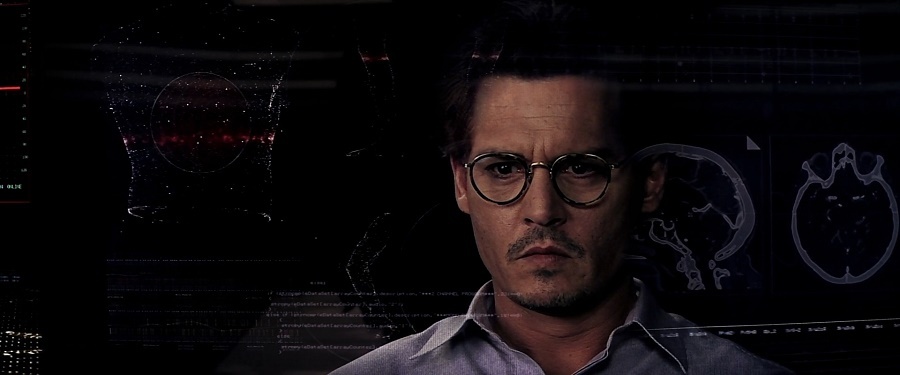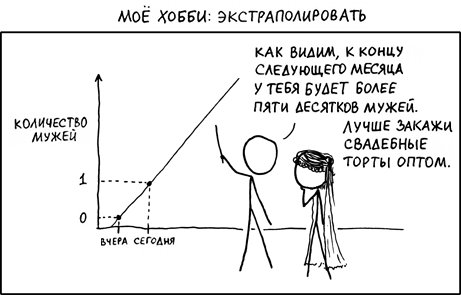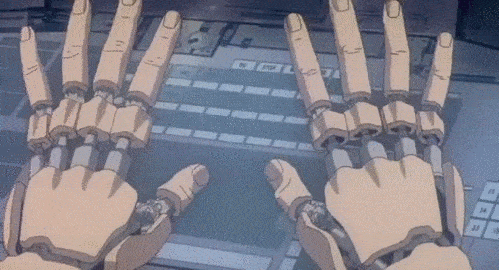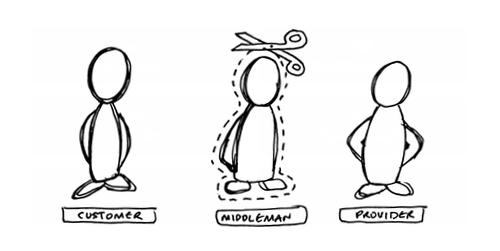Cyborgs against AI: how to prepare for the onset of singularity
A little about double standards: when Sergey Stillavin requires scientists to stop the launch of the Large Hadron Collider, because he heard that there is a risk of a black hole, everyone laughs at him . When Stephen Hawking warns that artificial intelligence can enslave humanity - everyone is straining. The result, however, is the same in both cases - the LHC starts up, neural networks develop racing with quantum computers. You can reproach me that comparing the superstitious horror of the middle hand of a radio presenter with a cautious warning from a world scientist is not entirely correct - but in both cases this is at least a reason to think about what progress is preparing for us.

You can understand why the Hawking warning did not have a significant impact on those interested in developing AI. It is not only a matter of the usual inertia of the processes - when goals are set, plans are drawn up and budgets are allocated, something more than the voice of a concerned public is needed to stop the accelerating staff. Researchers and programmers are on the side of common sense and all human experience: the predictions of alarmists have never come true, and the fears of the Luddites have made them a laughing stock in the historical perspective. Cities of Europe were not covered with horse manure, locomotive smoke did not kill crops and did not poison horses, labor migrants have not yet destroyed a single economy, 7 billion people did not starve to death and were not even mired in mud and a total war for resources, nuclear weapons did not lead to the apocalypse, 2000 didn’t destroy computer systems,
They continue to scare us: GMOs will infect everyone with cancer, quality medicine will lead to the degeneration of humanity, same-sex marriages will also lead to the degeneration of humanity, and artificial intelligence will enslave everyone who survives GMOs, quality medicine and same-sex marriage. However, the picture drawn by the alarmists is so bleak that I cannot rule out that the AI with such initial data simply refuses to enslave us - they say, well, you generally. That is if the alarmists are right. And alarmists are always wrong.
People may not fully understand how these or those processes occur, even if they are directly involved in them - but they understand the patterns: airplanes fly and do not wave wings, and progress makes people's lives better. And the faster progress accelerates, the faster the quality of life grows.
Mainly because they always see one side of things, underestimating the fact that any movement leads to consequences not only directly, but also from the opposite, cooling the ardor of extrapolation lovers.

Suppose it is more or less obvious that when she gets married, the bride calms down for a while - the presence of one husband cancels the need for new ones. At least at the same time. The system has balanced itself. A less obvious, but nevertheless widely recognized fact - an increase in living standards does not lead to endless reproduction. The surge in population growth is observed over a relatively short historical period - 2-3 decades, the life of one generation, after which the increased life expectancy and falling mortality are balanced by a drop in fertility. Simply put, when evaluating the consequences of an event, one must ask not only the question “what will happen when”, but also “what will not happen when”. Like that bride, people understand that they don’t need many children if they are sure of the survival of the existing one.
Assessing the consequences of an event, one must ask not only the question “what will happen when”, but also “what will not happen when”.
The property of any system is the desire for balance. Without this, a system cannot be a system. Whatever surprises progress presents, at one or another level, balance and harmony are always restored - at the level of a person, society, civilization or humanity as a whole. However, for any system there is a challenge, it can only be repaid by a level higher. Suppose global warming is believed to be a process that cannot be balanced by humanity itself, and therefore we will have to balance on a planetary level - say, melting Arctic ice and flooding industrial areas and megacities that are usually located in the lower coastal areas - like convenient, huh? - the ardor and the ability of mankind to warm up our ball in the future will greatly die. Wham, and the balance is restored again.
Many people believe that climatic cycles in general do not depend on human activity, and the exhaust problem will be settled at a civilizational level, without causing interference from planetary forces. Whether this is so or not is a moot point, but the principle, I think, is clear. Progress can theoretically give rise to challenges that cannot be balanced at the civilizational level, while keeping humanity moving for the better. It’s better not to wake Mother Earth if we don’t want to share the fate of the dinosaurs. By the way, the same Hawking believes that a global man-made disaster in the next thousand or ten thousand years is inevitable - so we need to quickly equip living space outside the home planet. Who would argue, we are all for. But this is still a relatively distant prospect.
Returning to the topic of the article, in order to understand whether enslavement by artificial intelligence threatens us, we need to understand whether AI refers to the challenges that will be balanced by civilization or will it be balanced at the expense of civilization?

But before the onset of the singularity, humanity will surely give battle to any chances of the AI to finally save or destroy it. Hawking noted that humanity is trying to improve itself genetically - but not fast enough. However, this is not the only way of evolution. In addition to the biological evolution, which sooner or later - rather sooner - will become controlled - there is technological and technological evolution.
Once upon a time, science fiction believed that cyborgs could put an end to the human race. But in practice, cyborgization is likely to become the next stage in the development of mankind, something described not by the words “introduction”, “breakthrough” or “next step”, which by definition implies some kind of effort, violence and breakdown, and into which humanity glides easily and joyfully, as now dived into social networks. Moreover, the general iPhone and socialization of people creates a demand for cyborgization, the ability to become cyborgs is expected stronger than the new iPhone.
Okay, of course, not a single focus group will tell you that. As in 2006, she would not say that she needs an iPhone:
However, now you don’t need to look for a new iPhone or even a new Internet for a long time: the bottleneck of the entire IT industry is interfaces. The computing power and capabilities of our devices, the capabilities of software to process our requests significantly exceed our capabilities to communicate these requests to them. Processing the simplest data arrays - for example, collecting statistics on all articles on the Habré and ranking them by views- They require programming skills, although even a child can understand what needs to be done, and the average computer can do the job in minutes. But at the stage between "understand" and "perform" - a formidable barrier in the form of the need for programming skills. A bottleneck that prevents us from taking advantage of the opportunities that we have. A popular quote reproaches us with this:

But access to knowledge is of little value without the ability to use it. Even before all computers, mathematicians were taught that it is important not to remember the formulas - they are all in the reference books - but to be able to apply them. Now the greatest knowledge of humanity to the bulk of humanity is available in read only mode - they can do nothing with them, even the simplest categorization and analysis - it cannot without special knowledge.
The invention of a method of communicating with machines without code — or at least manually entering it — could be a breakthrough in the level of the Internet as such. Humanity will receive not just unlimited access to knowledge, but access to the broadest possibilities of operating this knowledge and generating new knowledge. What is now called big data and feeds a limited number of highly paid specialists should and will be available to everyone - as mass education once rooted the profession of a scribe.
The explosive growth of human intellectual power will become inevitable. There is another popular joke - that each cemetery is full of unrecognized geniuses. I do not consider this a joke. Many brilliant ideas, talented books, and useful inventions never saw the light of day simply because not everyone is capable of devoting their lives to them or sometimes just not able to formulate them properly. Motivational articles and books are full of examples of people who have lost their hands and learned to write, code and play music with their feet. Or remember again the same Hawking.
But many people are unable even with both hands to use their full potential. And do not blame them for this - eyes, hands, voice - these are all interfaces. Powerful, comfortable, but imperfect. To one degree or another, they limit the creative possibilities of the human brain. There are many examples of how these possibilities are actually much wider than it might seem. Most of them are associated with technological progress.

One of the alarmist horror stories associated with it was that people would lose their jobs when machines began to do everything for them. However, as it turns out, with the development of technology, new types of work appear faster than the old ones die out. And it’s not only about the service sector, which used to be considered the destiny of future people - they say, while the cars feed, dress and treat us, people will only have to provide different people with different services.
The real revolution made by the invention of the iPhone was not a smartphone with a touch screen, but an open platform for the distribution of applications. People were given an interface - and hundreds of thousands, if not millions, began to fill it with their ideas on how to use it. Applications are serious business, because they change not only our everyday life - they change the very principles of our life. They could now take care of our health and safety at a level that is not accessible to the richest people in the world, but everything rests on the interfaces again. We are too alienated from our devices.
Google Glass, voice assistants Siri, Cortana and Google Now, and even the concepts of unusual octodon.mobi keyboardstrying to solve this problem. But these are all add-ons for add-ons - our hands, eyes and voice, with all their limitations. The real and obvious solution on the surface: you need to get closer to the brain.

Humanity is ripe for cyborgization, it craves cyborgization, it needs cyborgization and it will slip into this state as naturally as it creeps into its smartphone to check mail or new likes on Vkontakte.
The best thing is that people don’t even understand how they became cyborgs - they just buy another Apple iMind or Google Thoughts, no matter how they look and connect to our nervous system - like another gadget that draws us deeper into the World Wide Web. In the end, 90% of the capabilities of smart watches - to inform us of notifications from social networks, mail and instant messengers - and only then take the time, steps and pulse. With this sauce, people will accept any brain interface - if only it would be packed in a box more beautiful.
Another charm of cyborgization is that it will remove the growing inequality of generations, which in the future could be worse than social inequality - if you think about it, all these “grandmothers” for the older generation are simply humiliating. Now imagine yourself in 30 years in the face of future 10-year-olds - are you ready for the "grandfathers"? But the problem is not the difference in intelligence (although intellectual acceleration also exists), but in the need for training in new, constantly changing interfaces for interacting with computers. The calls to teach children programming only remove part of the problem - those who have already learned something earlier will always be in a position of catching up with those who learn the newest and most relevant from the state of tabula rasa.
This is similar to learning foreign languages - we all know that we need to learn them, and we learn, as far as possible, one after the other - sometimes forgetting that the point is not in knowing new languages as such, but in communicating and sharing knowledge, thoughts , feelings and ideas with people of a different culture. From this point of view, language is not a means of communication, but another barrier, another interface that limits the capabilities of man and mankind, and the task of progress is not to learn to ride through this barrier as a model racehorse, but to eliminate it entirely. To nullify its importance in communication.
Neural interfaces for humans and machines should do the same. And to do quickly - returning to the topic of the war between humans and machines, or rather, the future of humans in the reality of existing and functioning AI - perhaps the best guarantee that we will never lose the evolutionary race to machines will become machines themselves. Or at least learn to speak the same language with them.

You can understand why the Hawking warning did not have a significant impact on those interested in developing AI. It is not only a matter of the usual inertia of the processes - when goals are set, plans are drawn up and budgets are allocated, something more than the voice of a concerned public is needed to stop the accelerating staff. Researchers and programmers are on the side of common sense and all human experience: the predictions of alarmists have never come true, and the fears of the Luddites have made them a laughing stock in the historical perspective. Cities of Europe were not covered with horse manure, locomotive smoke did not kill crops and did not poison horses, labor migrants have not yet destroyed a single economy, 7 billion people did not starve to death and were not even mired in mud and a total war for resources, nuclear weapons did not lead to the apocalypse, 2000 didn’t destroy computer systems,
They continue to scare us: GMOs will infect everyone with cancer, quality medicine will lead to the degeneration of humanity, same-sex marriages will also lead to the degeneration of humanity, and artificial intelligence will enslave everyone who survives GMOs, quality medicine and same-sex marriage. However, the picture drawn by the alarmists is so bleak that I cannot rule out that the AI with such initial data simply refuses to enslave us - they say, well, you generally. That is if the alarmists are right. And alarmists are always wrong.
People may not fully understand how these or those processes occur, even if they are directly involved in them - but they understand the patterns: airplanes fly and do not wave wings, and progress makes people's lives better. And the faster progress accelerates, the faster the quality of life grows.
Mainly because they always see one side of things, underestimating the fact that any movement leads to consequences not only directly, but also from the opposite, cooling the ardor of extrapolation lovers.

Suppose it is more or less obvious that when she gets married, the bride calms down for a while - the presence of one husband cancels the need for new ones. At least at the same time. The system has balanced itself. A less obvious, but nevertheless widely recognized fact - an increase in living standards does not lead to endless reproduction. The surge in population growth is observed over a relatively short historical period - 2-3 decades, the life of one generation, after which the increased life expectancy and falling mortality are balanced by a drop in fertility. Simply put, when evaluating the consequences of an event, one must ask not only the question “what will happen when”, but also “what will not happen when”. Like that bride, people understand that they don’t need many children if they are sure of the survival of the existing one.
Assessing the consequences of an event, one must ask not only the question “what will happen when”, but also “what will not happen when”.
The property of any system is the desire for balance. Without this, a system cannot be a system. Whatever surprises progress presents, at one or another level, balance and harmony are always restored - at the level of a person, society, civilization or humanity as a whole. However, for any system there is a challenge, it can only be repaid by a level higher. Suppose global warming is believed to be a process that cannot be balanced by humanity itself, and therefore we will have to balance on a planetary level - say, melting Arctic ice and flooding industrial areas and megacities that are usually located in the lower coastal areas - like convenient, huh? - the ardor and the ability of mankind to warm up our ball in the future will greatly die. Wham, and the balance is restored again.
Many people believe that climatic cycles in general do not depend on human activity, and the exhaust problem will be settled at a civilizational level, without causing interference from planetary forces. Whether this is so or not is a moot point, but the principle, I think, is clear. Progress can theoretically give rise to challenges that cannot be balanced at the civilizational level, while keeping humanity moving for the better. It’s better not to wake Mother Earth if we don’t want to share the fate of the dinosaurs. By the way, the same Hawking believes that a global man-made disaster in the next thousand or ten thousand years is inevitable - so we need to quickly equip living space outside the home planet. Who would argue, we are all for. But this is still a relatively distant prospect.
Returning to the topic of the article, in order to understand whether enslavement by artificial intelligence threatens us, we need to understand whether AI refers to the challenges that will be balanced by civilization or will it be balanced at the expense of civilization?

A chance to go around a singularity on a curved goat
But before the onset of the singularity, humanity will surely give battle to any chances of the AI to finally save or destroy it. Hawking noted that humanity is trying to improve itself genetically - but not fast enough. However, this is not the only way of evolution. In addition to the biological evolution, which sooner or later - rather sooner - will become controlled - there is technological and technological evolution.
Once upon a time, science fiction believed that cyborgs could put an end to the human race. But in practice, cyborgization is likely to become the next stage in the development of mankind, something described not by the words “introduction”, “breakthrough” or “next step”, which by definition implies some kind of effort, violence and breakdown, and into which humanity glides easily and joyfully, as now dived into social networks. Moreover, the general iPhone and socialization of people creates a demand for cyborgization, the ability to become cyborgs is expected stronger than the new iPhone.
Okay, of course, not a single focus group will tell you that. As in 2006, she would not say that she needs an iPhone:
Creating a product based on focus groups is really difficult. More often than not, people don’t understand what they really need until they themselves show it to them.
- Steve Jobs, BusinessWeek (May 25, 1998)
However, now you don’t need to look for a new iPhone or even a new Internet for a long time: the bottleneck of the entire IT industry is interfaces. The computing power and capabilities of our devices, the capabilities of software to process our requests significantly exceed our capabilities to communicate these requests to them. Processing the simplest data arrays - for example, collecting statistics on all articles on the Habré and ranking them by views- They require programming skills, although even a child can understand what needs to be done, and the average computer can do the job in minutes. But at the stage between "understand" and "perform" - a formidable barrier in the form of the need for programming skills. A bottleneck that prevents us from taking advantage of the opportunities that we have. A popular quote reproaches us with this:

But access to knowledge is of little value without the ability to use it. Even before all computers, mathematicians were taught that it is important not to remember the formulas - they are all in the reference books - but to be able to apply them. Now the greatest knowledge of humanity to the bulk of humanity is available in read only mode - they can do nothing with them, even the simplest categorization and analysis - it cannot without special knowledge.
The invention of a method of communicating with machines without code — or at least manually entering it — could be a breakthrough in the level of the Internet as such. Humanity will receive not just unlimited access to knowledge, but access to the broadest possibilities of operating this knowledge and generating new knowledge. What is now called big data and feeds a limited number of highly paid specialists should and will be available to everyone - as mass education once rooted the profession of a scribe.
The explosive growth of human intellectual power will become inevitable. There is another popular joke - that each cemetery is full of unrecognized geniuses. I do not consider this a joke. Many brilliant ideas, talented books, and useful inventions never saw the light of day simply because not everyone is capable of devoting their lives to them or sometimes just not able to formulate them properly. Motivational articles and books are full of examples of people who have lost their hands and learned to write, code and play music with their feet. Or remember again the same Hawking.
But many people are unable even with both hands to use their full potential. And do not blame them for this - eyes, hands, voice - these are all interfaces. Powerful, comfortable, but imperfect. To one degree or another, they limit the creative possibilities of the human brain. There are many examples of how these possibilities are actually much wider than it might seem. Most of them are associated with technological progress.

One of the alarmist horror stories associated with it was that people would lose their jobs when machines began to do everything for them. However, as it turns out, with the development of technology, new types of work appear faster than the old ones die out. And it’s not only about the service sector, which used to be considered the destiny of future people - they say, while the cars feed, dress and treat us, people will only have to provide different people with different services.
The real revolution made by the invention of the iPhone was not a smartphone with a touch screen, but an open platform for the distribution of applications. People were given an interface - and hundreds of thousands, if not millions, began to fill it with their ideas on how to use it. Applications are serious business, because they change not only our everyday life - they change the very principles of our life. They could now take care of our health and safety at a level that is not accessible to the richest people in the world, but everything rests on the interfaces again. We are too alienated from our devices.
Google Glass, voice assistants Siri, Cortana and Google Now, and even the concepts of unusual octodon.mobi keyboardstrying to solve this problem. But these are all add-ons for add-ons - our hands, eyes and voice, with all their limitations. The real and obvious solution on the surface: you need to get closer to the brain.

Humanity is ripe for cyborgization, it craves cyborgization, it needs cyborgization and it will slip into this state as naturally as it creeps into its smartphone to check mail or new likes on Vkontakte.
The best thing is that people don’t even understand how they became cyborgs - they just buy another Apple iMind or Google Thoughts, no matter how they look and connect to our nervous system - like another gadget that draws us deeper into the World Wide Web. In the end, 90% of the capabilities of smart watches - to inform us of notifications from social networks, mail and instant messengers - and only then take the time, steps and pulse. With this sauce, people will accept any brain interface - if only it would be packed in a box more beautiful.
Another charm of cyborgization is that it will remove the growing inequality of generations, which in the future could be worse than social inequality - if you think about it, all these “grandmothers” for the older generation are simply humiliating. Now imagine yourself in 30 years in the face of future 10-year-olds - are you ready for the "grandfathers"? But the problem is not the difference in intelligence (although intellectual acceleration also exists), but in the need for training in new, constantly changing interfaces for interacting with computers. The calls to teach children programming only remove part of the problem - those who have already learned something earlier will always be in a position of catching up with those who learn the newest and most relevant from the state of tabula rasa.
This is similar to learning foreign languages - we all know that we need to learn them, and we learn, as far as possible, one after the other - sometimes forgetting that the point is not in knowing new languages as such, but in communicating and sharing knowledge, thoughts , feelings and ideas with people of a different culture. From this point of view, language is not a means of communication, but another barrier, another interface that limits the capabilities of man and mankind, and the task of progress is not to learn to ride through this barrier as a model racehorse, but to eliminate it entirely. To nullify its importance in communication.
Neural interfaces for humans and machines should do the same. And to do quickly - returning to the topic of the war between humans and machines, or rather, the future of humans in the reality of existing and functioning AI - perhaps the best guarantee that we will never lose the evolutionary race to machines will become machines themselves. Or at least learn to speak the same language with them.
